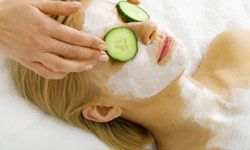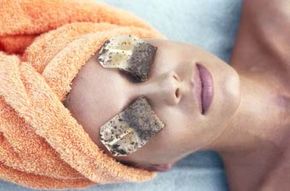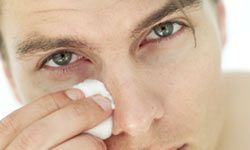The home remedies found below, are easy to locate and will relieve you from some of the discomfort caused by puffy eyes.
From the Home Remedies Cupboard
Tea. Green tea or black? Both work well to soothe puffy, irritated eyes. The difference? Not much. Caffeinated teas help constrict blood vessels and reduce swelling, while herbal teas (especially chamomile) contain anti-irritants that soothe redness and inflammation. Steep 2 bags of your choice of tea in hot water for three to five minutes. Let cool until the bags are comfortably warm to the touch. Lie down, close your eyes, and place a tea bag over each eye; then cover with a soft cloth. During hot months, put the cooked tea bags in the refrigerator and apply to eyes when needed for a refreshing, eye-opening experience.
From the Home Remedies Drawer
Spoons. Teaspoon-size spoons are just the right utensils for temporarily helping your eyes reduce to normal proportions. Place 4 or 6 spoons in the refrigerator. When you need to deflate those eyeballs, lie down, close your eyes, and place one spoon (curved side down) on each eye. As the spoon warms, replace it with a cold one from the fridge.
From the Home Remedies Refrigerator
Cucumbers. From the vegetable bin comes the well-known cucumber remedy. Cucumbers aren't only deliciously cool and soothing to the touch, but their astringent properties cause blood vessels to constrict. Lean your head back, rest a slice on each closed eye, and relax for five to ten minutes while the cukes cure your puffiness.
Egg whites. Call this kitchen cure a souffle for the face. Whip up 1 or 2 egg whites until stiff, and apply with a brush or soft cloth underneath your eyes. The skin will feel tighter and look less like puff pastry.
Potato. The common potato also pampers puffy eyes. Tubers are tried and true in European folk medicine as a means to soothe painful joints, headaches, and other inflammatory conditions. Potato starch acts as an anti-inflammatory agent to ease irritated eyes. Start by pretending you're making hash browns. Peel one potato, then wash and dry it. Grate the potato as fine as possible, then instead of frying it up with butter, place the pulp in a clean cloth and fold to make a poultice. Place the poultice on your eyelids for 15 minutes.
From the Home Remedies Sink
Cold water. Eyes seem to puff up on workday mornings when you have 30 minutes to get ready. There's no time to luxuriate with tea bags and cucumber slices --but don't despair. Cold water will work in a pinch. Rise and shine, and rinse your face with several splashes of cold water. This may be a rude awakening, but the coldness will constrict blood vessels and reduce swelling. Plus, it only takes ten seconds. Repeat throughout the day if possible.
Drinking water. Water is the saving grace when it comes to reducing eye puffiness. Be sure you drink at least eight 8-ounce glasses of water each day, and don't substitute sodas, coffees, or sugary drinks. When the body is dehydrated, it acts much like a camel, storing water for the long haul across the desert. Instead of a camel's hump, you'll develop water reserves around the eyeballs. By keeping yourself adequately hydrated, the body isn't put into survival mode and won't puff up in all the wrong places.
From the Home Remedies Spice Rack
Salt. Jumbo fries, pepperoni pizza, and other salt-intense foods can cause puffy eyes. However, salt by itself does the eyes good. Get rid of the puffy eyes by mixing 1/2 teaspoon salt into 1 quart warm water. Dip cotton balls or facial pads into the solution, then lie down and apply pads to the eyelids. Rest in this position for at least ten minutes while keeping the pads in place. You'll arise with deflated eyes.
Do Remember
- Enjoy a light self-massage, which can help relieve puffy eyes. Close your eyes and gently press your ring finger underneath one eye, moving in an arc shape from the inside corner to the outside corner. Massage 10 to 15 times. Then repeat on the other eye. This is a great massage to do before jumping out of bed.
- Use two pillows to keep your head elevated while sleeping. Fluid won't accumulate underneath the eyes.
- DON'T vigorously rub your eyeballs in the morning. Avoid touching them throughout the day.
- Watch what you wear. Do your eyes puff up midday? For women, beauty products may be the culprit. Many fingernail polishes, hair sprays, and makeup contain formaldehyde, which can cause eyes to swell. Luckily, the fashion industry is wising up and new formaldehyde-free beauty products are hitting the shelves. Use the process of elimination, avoiding each product for one to two weeks, to determine which is causing the blow-up.
- Give your eyes a break! For every hour you are on the computer, take a five- to ten-minute rest. Stare out the window, close your eyes and meditate, or stroll to the water cooler. While working on the computer, try to look away every few minutes.
- Keep your bedroom free from dust, pollen, and animal dander. Remove all dust-collecting objects, wash sheets once a week in very hot water, cover the mattress and pillows with dust-mite protective coverings, and bar pets from the bed. During pollen season, wash your hair before hitting the pillow, and use air conditioning instead of opening the window.
- Use hypoallergenic soaps and fragrance- and color-free detergen.
For more information about eye care and other associated factors to this little bother, try the following links:
- To see all of our home remedies and the conditions they treat, go to our main Home Remedies page.
- Cataracts are very common in the elderly, but there are some herbal remedies that can keep this condition at bay. Find out how in Herbal Remedies for Cataracts.
- Reducing your puffy eyes might simply require you care for your eyes a bit more. Read about how to do it in How to Care for Your Eyes.
- If you think your puffy eyes might be a result of not getting enough sleep, you might want to review some Home Remedies for Insomnia.
- A puffy face may be the result of an inflamed sinus cavity, which you can treat with Home Remedies for Sinusitis.
David J. Hufford, Ph.D., is university professor and chair of the Medical Humanities Department at Pennsylvania State University's College of Medicine. He also is a professor in the departments of Neural and Behavioral Sciences and Family and Community Medicine. Dr. Hufford serves on the editorial boards of several journals, including Alternative Therapies in Health & Medicine and Explore.
This information is solely for informational purposes. IT IS NOT INTENDED TO PROVIDE MEDICAL ADVICE. Neither the Editors of Consumer Guide (R), Publications International, Ltd., the author nor publisher take responsibility for any possible consequences from any treatment, procedure, exercise, dietary modification, action or application of medication which results from reading or following the information contained in this information. The publication of this information does not constitute the practice of medicine, and this information does not replace the advice of your physician or other health care provider. Before undertaking any course of treatment, the reader must seek the advice of their physician or other health care provider.


